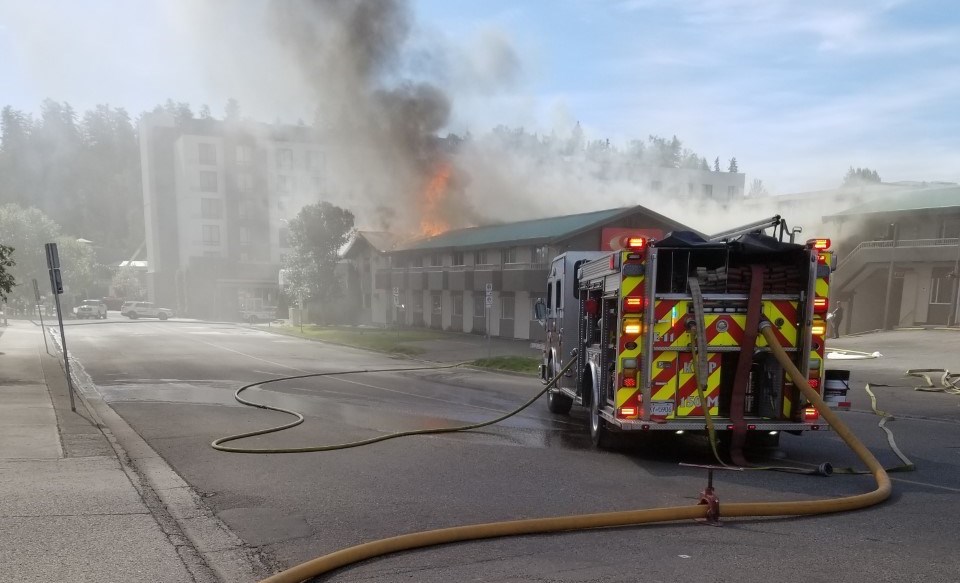A potentially key piece of evidence has been put in doubt after a judge found Prince George RCMP failed to provide a man accused of setting a deadly fire timely access to a lawyer.
In a decision issued Wednesday, B.C. Supreme Court Justice Margot Fleming found police imposed an unneeded delay in giving Justin Kyle Aster an opportunity to speak to a lawyer when he was arrested on September 16, 2020, violating his rights under the Charter of Rights and Freedoms in the process.
However, whether the delay was enough to bring the administration of justice into disrepute is still to be determined. Crown and defence counsels will provide arguments on that aspect at a later date.
Fleming issued a similar decision last month regarding the initial detention and arrest of Aster on July 11, 2020, three days after a fire ripped through the east end of the Econo Lodge Motel on Ninth Avenue at Victoria Street. Three people were killed in the blaze.
However, both Crown and defence counsels confirmed Wednesday that in a subsequent decision, Fleming ruled a statement Aster gave to police on that day was nonetheless admissible.
At the time, Aster admitted he had passed through the Econo Lodge at about the time the fire had erupted but denied he had set the blaze, believed to have been ignited in a pile of carpeting and underlay that had been left under a stairwell while a renovation was being carried out.
Aster was not charged following his July 2020 arrest and was let go the next day. But he remained a suspect and, on September 16, 2020, he was picked up once again and this time charged with three counts of criminal negligence causing death and one count each of arson in relation to an inhabited property and arson damaging property.
Although RCMP began planning the arrest of Aster some three days before the apprehension, Fleming found RCMP never discussed how to afford him the first reasonable opportunity to contact a lawyer.
Recounting testimony provided during a voir dire, or trial within a trial, on the matter, Fleming found RCMP should have given Aster access to a cellphone in the minutes following the apprehension rather than wait until the booking process had been completed at the detachment.
RCMP had tracked Aster down to the Moccasin Flats encampment in the light industrial area east of the city's downtown. Police placed him in an unmarked RCMP vehicle and initially opted to wait for a marked vehicle with tighter and more secure confines in the back, to take him to the detachment but, after a few minutes, decided to transport him in the unmarked vehicle.
Defence counsel Jason LeBlond had argued that Aster should have been provided a cellphone at the scene of the arrest and Fleming agreed. In answer to concern raised by Crown that keeping Aster in Moccasin Flats any longer than necessary could have posed a safety hazard, Fleming said police could simply have driven him a short distance to a spot outside the encampment and let him make a call there.
Fleming also disagreed with a contention that even with the windows rolled up, police could have eavesdropped on the conversation between the two if Aster was able to reach LeBlond while still in the RCMP vehicle, noting Aster speaks with a soft voice.
Noting Aster was wearing only shorts, a T-shirt and flip-flops at the time of his arrest, Fleming found he did not pose a risk serious enough for a full search prior to giving him a chance to call a lawyer. Police "should have at least considered reprioritizing" the process used to deal with Aster, the judge found.
The judge found police delayed Aster's initial chance to reach counsel by at least 10 minutes and by a further 13 minutes at the detachment when an officer missed a call back from LeBlond after a first attempt to reach him had gone unanswered.
Fleming did find that a statement Aster subsequently gave to RCMP was voluntary but could still be ruled inadmissible as a result of the concern over timely access to counsel. Presented by police with video and photos allegedly showing him passing through the scene, like he did in July 2020, Aster once again denied setting the fire and maintained he only was only looking for cigarette butts.
The trial is scheduled to resume on May 15.



